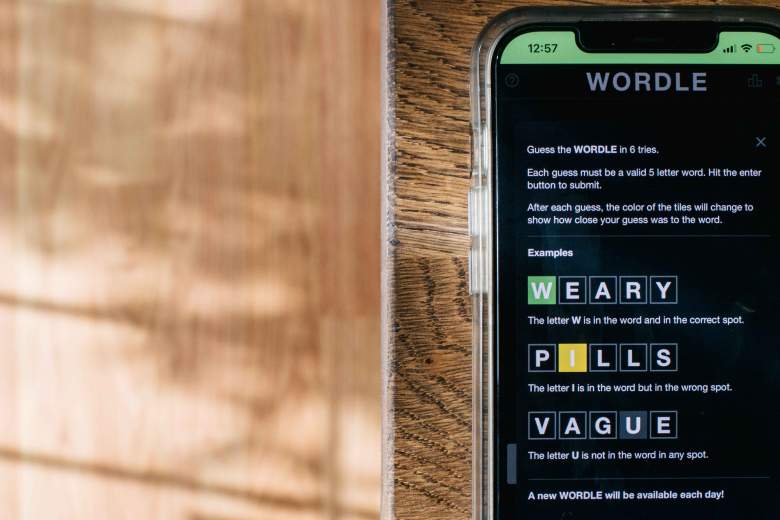
Getty In this photo illustration, the word game Wordle is shown on a mobile phone on January 12, 2022 in Houston, Texas. The online word game Wordle has gone viral after initially gaining momentum in October of 2021. Created by software engineer Josh Wardle, the game now has more than 2.7 million players.
Today’s Wordle answer has some players searching for a dictionary after they plugged in a few logical letters and learned that “trice” was a word September 19, 2022. But what is its meaning or definition?
The word “trice” can be used as a noun or as a verb. It has very different definitions depending on the part of speech, according to Merriam-Webster’s dictionary. The dictionary says that “trice” is most often used in the phrase, “in a trice,” meaning that it will happen quickly.
Here’s what you need to know:
‘Trice’ Is a Synonym for ‘Jiffy’ & Can Also Be Related to Hauling Up & Securing
“Trice” is most commonly used as a noun in the phrase, “in a trice.” Merriam-Webster’s dictionary defines “trice” as “a brief space of time : INSTANT —used chiefly in the phrase in a trice.” That is the definition of “trice” as a noun.
If you wanted to use “trice” in a sentence, you might say “it’s just a scrape on the knee—we’ll have you fixed up in a trice,” the dictionary says.
It can also be used as a verb, meaning, “to haul up or in and lash or secure (something, such as a sail) with a small rope.” Something can also be triced, or, if you are hauling and securing something right now, you might be tricing.
Both definitions of the word trace their roots back to the 15th Century, the dictionary says.
Synonyms for “trice” as a noun include “beat, eyeblink, flash, heartbeat, instant, jiff, jiffy, minute, moment, nanosecond, New York minute, second, shake, split second, twinkle, twinkling, wink,” the dictionary entry says.
‘Trice’ Stems From a Middle English Word Meaning ‘to Pull Up’ or ‘Hoist’
The word “trice” as a noun stems from the Middle English word “trise,” which means “to pull” and comes from the word “trisen,” according to Merriam-Webster’s dictionary. As a verb, the word stems from the Middle English words “trisen,” or “tricen,” meaning to pull, and trice, from the Middle Dutch word “trisen,” meaning “to hoist,” from “trise” windlass, the dictionary says.
While there likely aren’t often as many reasons to use the verb form of the word in modern times, the dictionary records recent usage of the word. On July 5, 2022, an article in the “Los Angeles Times” said “at least a hundred people died in that one, including 15 who were standing on bridges marveling at the rush of waters when, in a trice, the waters tore away the bridges,” according to the dictionary.
Selena Takigawa Hoy used the word in an article published in “Leisure + Travel” June 21, 2021, the dictionary said. Hoy wrote: “The precarious bridges, as conventional wisdom goes, could be cut down in a trice, leaving enemies stymied.”
Kyle Smith used the word in an article for “National Review” published October 8, 2019, the dictionary entry said. Smith write, “In a trice, the amicability recedes to approximately the level of the battle of Verdun.”
“The Economist” also printed the word on July 11, 2019, the dictionary said. Their article said, “One side of the balance-sheet is hard-to-sell loans; the other side is deposits that can be withdrawn in a trice.”
READ NEXT: Kobe Bryant Crash Text Messages Provide Window Into His Last Hours
